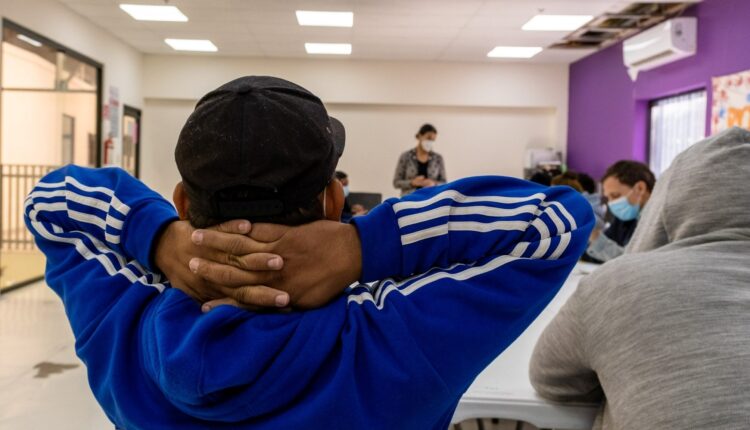Tucson city leaders suggest moving asylum-seekers to Phoenix or military base as funding runs out
Tucson city leaders suggested thousands of people seeking asylum, who could get dropped off on Tucson streets, should be sent to Phoenix where there is more capacity for shelter, transportation and other services.
City council members offered a variety of ideas for how to handle the potential of thousands of asylum-seekers who might be bused to Tucson by U.S. Customs and Border Protection if federal funding runs out at the end of March. Options included dropping people off at Davis-Monthan Air Force Base or local Border Patrol headquarters, as well as moving people to Phoenix and making it Phoenix’s concern.
Tucson Mayor Regina Romero stressed the importance of finding a location to drop off asylum-seekers that is both prudent and responsible. Romero suggested Phoenix saying, “they have the capacity for it.”
Romero said she and Pima County Board of Supervisors Chair Adelita Grijalva have been “sounding the alarm” on this issue since December. They sent a letter to Arizona Gov. Katie Hobbs asking for help in January.
Romero suggested some asylum-seekers should be moved to Phoenix, where there’s more social-services capacity and more transportation options for people who are trying to get to other places in the country while awaiting asylum.
It seemed like a move from Texas Governor Gregg Abbot’s political playbook, when he sent buses of migrants to Vice President Kamala Harris’s residence in May, literally putting the issue on her doorstep.
The city leaders’ conversation at the council meeting Wednesday came a day after Pima County leaders met and decided they will stop providing shelter to asylum-seekers if the federal funds run out.
The federal money for Pima County’s response was for 700 people a day and now there are 1,000 or more asylum-seekers daily.
Local leaders have said the current federal funding will run out in late March without a new federal budget agreement.
Tucson City Council Member Paul Cunningham said what’s happening in Southern California — people seeking asylum being dropped at bus stops rather than where they can get assistance, according to an article from CalMatters — could have happened or could happen in Tucson. But so far the Southern Arizona community’s response has meant people seeking asylum are not left on the street.
Pima County Administrator Jan Lesher visited the city council meeting Wednesday to share updates on the dwindling federal funds for sheltering people seeking asylum and provide a deadline on when these funds would expire.
She also suggested getting the Federal Emergency Management Agency (FEMA) involved.
“Pretend this is a hurricane,” Lesher said. If a humanitarian crisis of this size was the result of a natural disaster, FEMA would be here with resources, she said.
Romero expressed frustration with Congress for abandoning a recent bipartisan immigration reform bill and not working to find long-term solutions and a comprehensive approach to fixing “our broken immigration system.”
“Unfortunately, (Congress) have been using human beings as political pawns and refusing to do their jobs,” the mayor said, raising her voice.
Councilmember Steve Kozachik condemned the inaction of the federal government, leaving the issue up to Pima County to handle on its own.
“Kudos to this community for stepping up, and shame on the federal government for not doing their job and dropping it in our lap,” Kozachik said.
Democrats Kozachik and Cunningham emphasized that the systemic issues of people legally seeking asylum, illegal immigration and homelessness are separate but related issues.
“These are not illegal aliens who are descending on Tucson,” Kozachik said angrily addressing comments made during Tuesday’s Pima County Board of Supervisors meeting. “These are legally processed asylum-seekers.”
Lesher said the county has been coordinating the local response — shelter, transportation, food and other provisions — since April 2019 and the work has been paid for by federal dollars.
“It is not appropriate for local tax dollars to go to what we believe is a uniquely federal problem and concern,” she said.
There is a six-week runway to find funding and service providers already are winding down contracts, according to Lesher. “It would be difficult to do this program only looking at it from one or two weeks at a time,” she said.
City Manager Michael Ortega agreed. He called the dwindling federal funding a Band-Aid and said the true fix is comprehensive immigration reform. The city shouldn’t spend local taxpayer dollars on federal immigration systems, Ortega said.
“There is no path that I see where we would be able to afford funding any kind of effort along the lines of what we’re talking about,” at a potential cost of $1 million a week, Ortega said.
This article first appeared on AZ Luminaria and is republished here under a Creative Commons license.



Comments are closed.